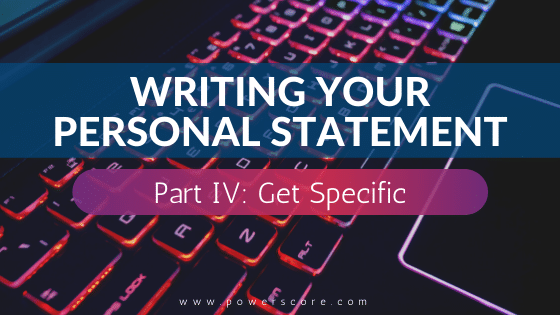Although all components of a law school application are important, the most important one is the personal statement. To that end, this series explains some of the pivotal points you should keep in mind as you prepare to write your law school application personal statement. This is a 10-part series that will help get you from starting to finishing your personal statement.
Get Specific
A personal statement is only as powerful as the story it tells, and the story is only as powerful as the details that comprise it. In this installment of “Writing Your Personal Statement,” we go over something that’s just as important as getting personal: Getting specific.
Once again, remember that your personal statement is ultimately your on-paper interview with the Admissions Committee(s) of the school(s) you apply to. And, again, this essay should be talking about you. However, understanding these two very important principles can still yield a less-than-stellar personal statement unless you truly connect with the reader. So, how do you make a connection with your reader? Give them specifics. What do we mean by specifics? In the context of a law school personal statement, it doesn’t mean you should describe every minute detail during the events you choose to write about. It’s not about regurgitating dialogue word-for-word on a page, either. Specifics, in law school application lingo, mean events that back up your claims.
Specific Examples
To that end, here are some examples of some of the specifics one could employ.
- You want to study law in order to become a public defender and help people. In this scenario, back up your claim with a story that shows yourself doing exactly that! How did you help out a client at an internship or a part-time job? Do you have a story about helping out with a local charity? Have you ever been a part of a volunteer opportunity such as a soup kitchen? These experiences back your claim to want to help people.
- You have a strong will and are capable of overcoming adversity. Back up this claim with a relevant anecdote. Did you excel academically in high school and college despite a rough upbringing or a lack of academic support? Have you fought against the odds at something you’re proud of? Have you ever started an organization or group that highlights diversity and perseverance? Pick occasions where you demonstrate a strong will and past events that show your capability of overcoming adversity.
- Do you need to redeem indiscretions that you’ve made up for? If you’re in a situation where your past is not indicative of your current potential, you need to reinforce that claim with specific examples. Share stories demonstrating your exemplary work ethic and drive. Have you spent your probation in positive ways such as mentoring at-risk youths? Are there any organizations that you involved yourself in to become a better person to society?
Get the idea? Many students speak in generalities. “I want to study the law to help others, my past will not affect my future, the things I survived make me a stronger person.” While all of those may be true, they are general statements that make essays seem passionate and impressive. In reality, generalities ring hollow even if they touch on things that are true to the writer.
Put Yourself in the Admissions Committee’s Shoes
Pretend that you’re interviewing someone for a position. Wouldn’t you want to hear them back up their claims? Imagine you’re hiring someone to work as a teacher. Would you simply believe them when they say they can teach very well? Or would you want them to demonstrate that claim by talking about difficult situations they’ve faced in the classroom and how they’ve overcome them? If you’re looking to hire someone to manager your office, would you be satisfied with hearing that they can manage a large group of people? Or do you want an example of overcoming a complex office logistics problem they encountered and resolved amicably?
Specifics do more than make you memorable, they also make you believable. Ask yourself what you’re capable of and then explain why you think that. Don’t just generalize the things you think you’re capable without any sort of evidence, it can make you sound empty. You don’t want law school admissions members raise an eyebrow when reading your statement. Think of your personal statement as the centerpiece of the “case” your presenting to schools as to why they should let you in; give them as much specific evidence as you can to back up your theory that you will not only be a successful law student, but also a successful attorney.
Read More in This Series
- Take Your Time
- Plan It Out
- Get Personal
- Get Specific (You Are Here)
- Embrace Variety
- Step Away
- Edit
- Involve Others
- Proof
- Don’t Be Afraid
Subscribe to the blog to get notifications when we post new content!


Leave a Reply